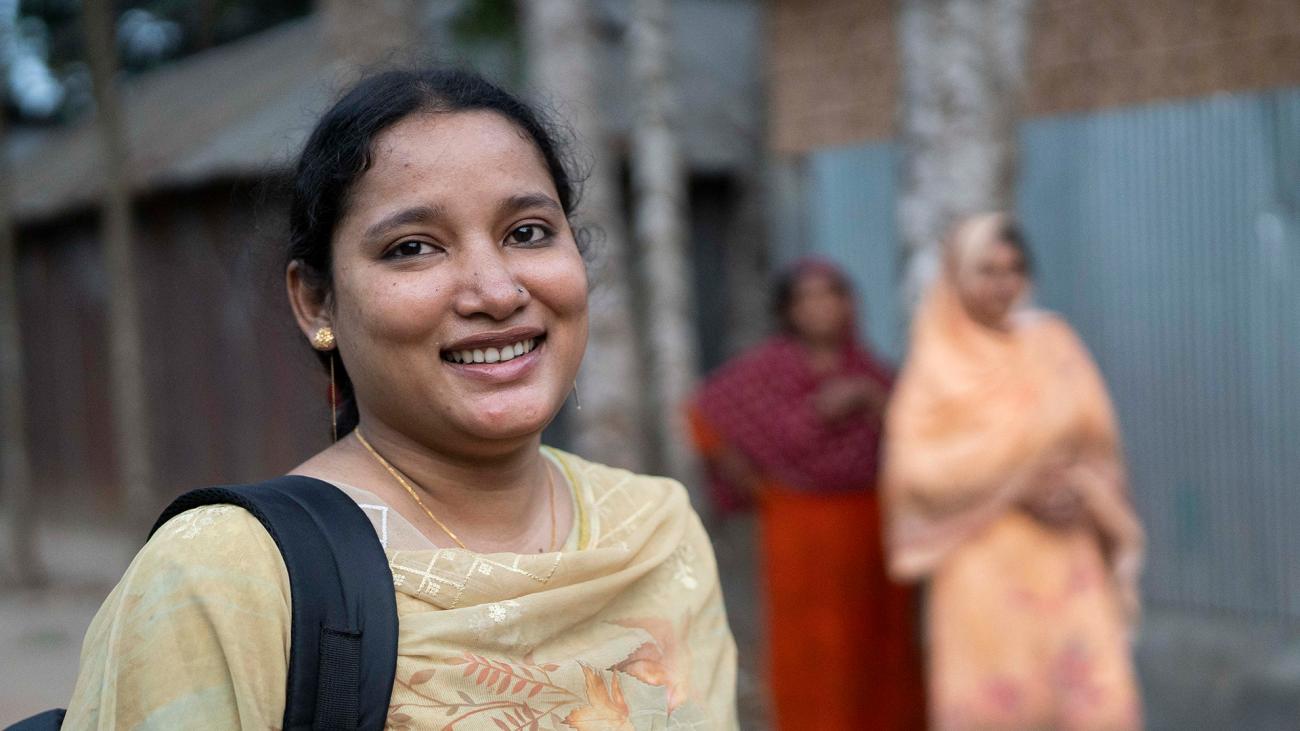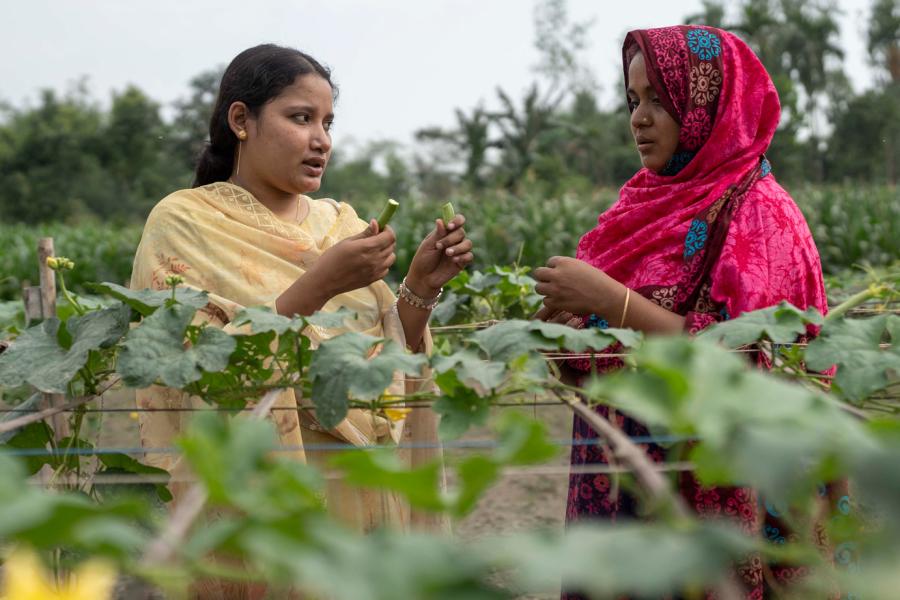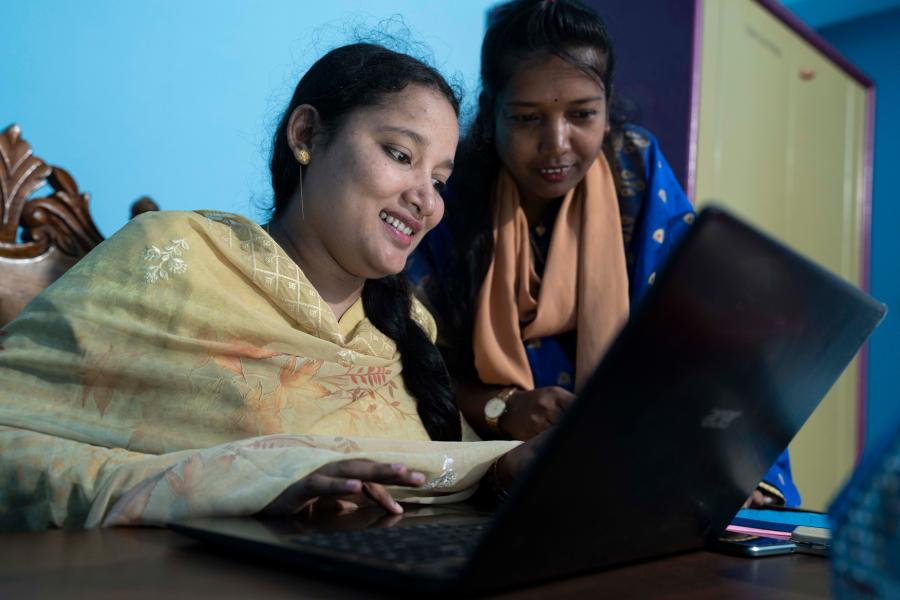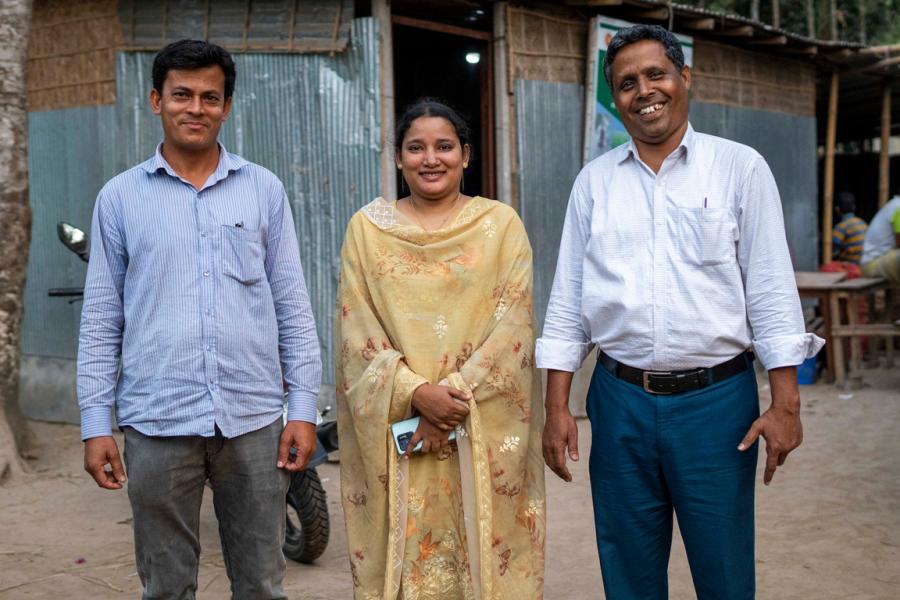Women and youth lead the way in Bangladesh’s agricultural transformation

A voice for Bangladeshi smallholder farmers
26/08/2024
Salma Akter Aduri’s family were hoping that growing cash crops would be the answer.
“We were growing a special type of potato called the ‘sunshine potato’, which can grow fast with good yields,” Salma recalls. “But the amount we had to sell was so small, we just couldn’t sell them at a profitable price.”
Salma and her family are potato farmers from Rangpur in northwestern Bangladesh. This region is prone to destructive monsoon floods and seasonal drought, and farmers here are increasingly reliant on cultivating cash crops to withstand these frequent weather-related shocks. But even this wasn’t working.
“Many of our neighbours were in the same boat. They leased land to grow these potatoes but couldn’t even make enough to pay back the lease.”
The situation was becoming dire. It looked like they would be forced to either give up their land or take high-interest loans from moneylenders. Salma was worried about her family’s farming future and even wanted to leave agriculture altogether.
A Breakthrough

When Salma’s family joined the Birahim Farmer’s Cooperative, it proved a turning point.
The producers’ organization received crucial support through the Missing Middle Initiative, implemented by the Food and Agriculture Organization of the United Nations (FAO) and funded by the Global Agriculture and Food Security Program (GAFSP).
In collaboration with the Ministry of Agriculture and the Sara Bangla Krishak Society (SBKS) – a national federation of farmers’ organizations in Bangladesh including Birahim – this FAO initiative worked with farmers to expand their access to finance, markets, technology and information.
“This support was vital,” Salma states. “We realized the importance of bulk selling our produce together with other farmers, so we could access markets offering higher prices. We finally got access to finance at competitive rates. And with these benefits, Birahim membership grew!”
In 2018, Salma was fresh out of high school and awaiting university admission. She stepped in to help with Birahim’s record-keeping.
With FAO support, Birahim then made a breakthrough by connecting with the Bangladesh Potato Exporters Association.
“Seeing our potatoes being exported was a dream come true for me and my family,” Salma exclaims. “It made me want to support other communities to export as well.”
As potato farmers, Salma’s family joined the Birahim Farmer’s Cooperative, which received crucial support in expanding their access to finance, markets, technology and information. This support was part of the Missing Middle Initiative, implemented by FAO in collaboration with the Ministry of Agriculture and the Sara Bangla Krishak Society, and funded by GAFSP. ©FAO/Saikat Mojumder
Innovation amidst Adversity

The COVID-19 pandemic prompted Birahim to innovate. With support from SBKS and FAO, Birahim and other producer organizations established a Virtual Call Centre (VCC) to keep their community’s farming business operational.
The VCC became a critical hub, providing agricultural advice, market information and financial services to farmers remotely. Salma, recognized for her dedication, was appointed as a VCC Operator in 2020.
“My family was resistant due to our conservative background, but the president of the producer organization convinced them. After the training, I was taken more seriously,” Salma explains.
Crucially, she was also paving the way for more women in her community and inspiring other young people. “Now they are asking me about opportunities to get involved in agriculture. It’s exciting,” she says enthusiastically.
Rising to Become a Leader

Salma’s skills and expertise as a VCC operator led to her appointment as an accountant for Birahim.
She also became a farmer business facilitator, monitoring the management, finances and business plans of other producer organizations.
Initially, she experienced some teasing and scepticism. She also faced challenges working with older male leaders in other communities.
But her strategic approach helped overcome resistance. “Over time, they came to respect my knowledge and experience!”
Meanwhile, FAO and SBKS, with further funding from GAFSP, launched the ACCESS project, which works with producer organizations in climate-affected areas to access local value chains.
ACCESS builds on the successes of the Missing Middle Initiative – in which 10,000 smallholders saw an average 35 per cent increase in annual incomes.
With opportunities from ACCESS, Salma has honed her skills and become an accountant for SBKS’s Secretariat. Birahim is also successfully exporting potatoes and has started a vegetable seed business. ©FAO/Saikat Mojumder.
Financial stability and a vision for the future
Now, the Birahim cooperative continues to successfully export potatoes and has started a vegetable seed business.
“We received help to access credit and market our seeds, and we are working with reputable partners across Bangladesh, producing quality vegetable seeds,” Salma says with pride.
Banks are also getting involved in developing modern technologies for vegetable seed production. The Dutch-Bangla Bank is funding SBKS and the Bangladesh Agricultural Research Institute, enabling Birahim farmers to produce five tons of vegetable seeds annually.
“It’s been a significant journey for our community, from struggling to repay loans to achieving financial stability,” Salma reflects.
Salma has recently joined SBKS’s Secretariat as an accountant. She has risen to become a community leader in agricultural innovation and empowerment. “I want to help other communities access export markets, so they can benefit from financial stability and higher incomes,” she declares.
“I want to see more women empowered under ACCESS and for our network of smallholder farmers, SBKS, grow to national recognition.”
Salma’s story is part of a series of FAO feature stories to mark the 60th anniversary of the FAO Investment Centre, highlighting decades of partnerships, initiatives and investments that have shaped agrifood systems. Explore how the FAO Investment Centre continues to drive agricultural investment and finance solutions, transforming lives globally.








